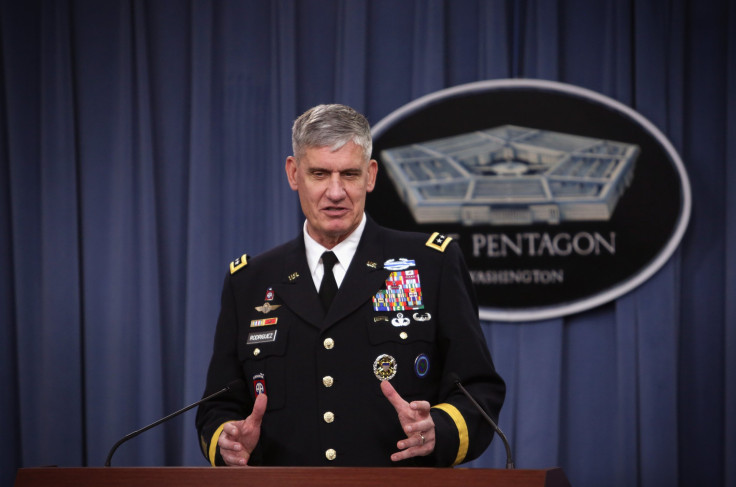US General Says Ebola Mission Will Cost $750 Million, Reverses Statement on Troop Interaction With Ebola Patients

The U.S. military mission to help contain the Ebola crisis in Africa will cost $750 million over six months but could last "about a year," Gen. David M. Rodriguez, commander of U.S. troops in Africa, told a news conference Tuesday.
Rodriguez also commented a small number of troops involved in the operation would directly treat Ebola patients in mobile laboratories, contradicting the Obama administration's earlier claim that U.S. troops would not interact with patients but would focus on building treatment centers and offering other logistical support. But Rodriguez walked back his comments in a statement released Tuesday afternoon.
"In response to comments I made today about U.S. military personnel potentially coming in direct contact with Ebola infected individuals, specific to lab testing, I want to clarify my remarks. U.S. military personnel working in the labs are not interacting with patients, only samples," Rodriguez said in the statement. "The testing labs are manned by highly skilled and trained personnel from the U.S. Naval Medical Research Center. These labs provide 24-hour turnaround results on samples received from area clinics and healthcare providers, with the capability to process up to 100 samples per day.”
The U.S. military effort includes the dispatch of 4,000 troops who will help build treatment facilities, conduct testing and training in mobile labs, and offer additional training, diagnostic and engineering support. Rodgriguez said while he didn't expect the need for more than 4,000 personnel, he wouldn't rule it out for the future. The troops will be based in several West African countries, including Liberia. A main unit from the 101st Airborne Division, located in Fort Campbell, Kentucky, will deploy for Monrovia, Liberia's capital, within the next few weeks.
Rodriguez added he was "confident we can ensure our service members’ safety and the safety of the American people." Any soldiers exposed to the virus would be flown back to the United States for treatment, and the military had strict protocols in place to ensure the safety of its troops.
The Pentagon expects to complete 17 treatment centers in Monrovia by November, but troops could stay up to one year, based on estimates of how long it would take to help extend treatment to 70 percent of Ebola victims. "This is not a small effort and this is not a short period of time," Rodriguez said.
The Ebola crisis in West Africa has claimed more than 3,400 lives thus far, the World Health Organization reports.
© Copyright IBTimes 2024. All rights reserved.





















